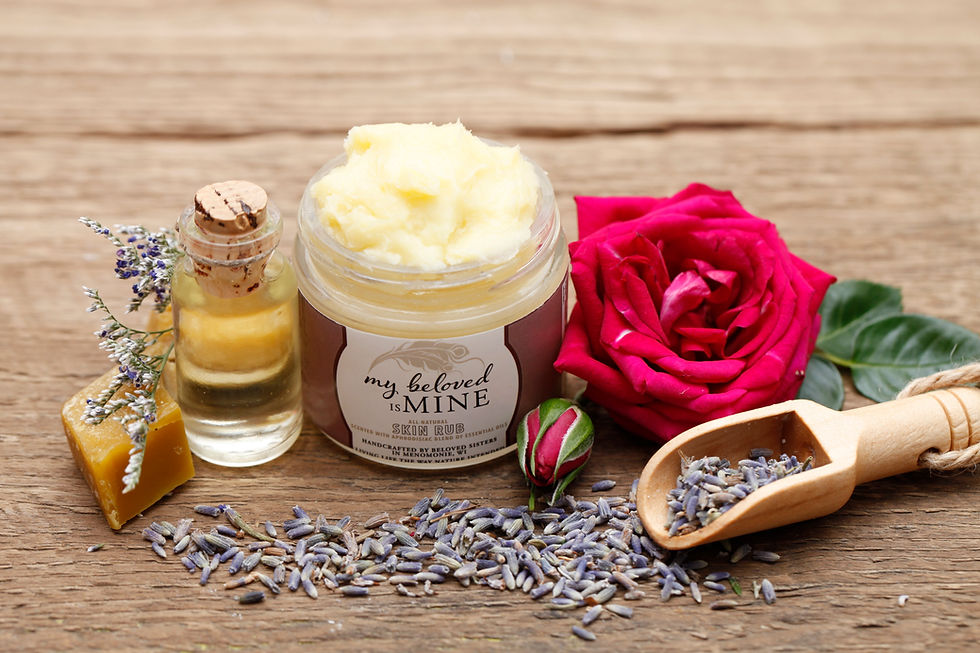Insect Repellent
- Serge and Veronika
- Jun 17, 2019
- 3 min read
Updated: Apr 2, 2025
Do you love being outdoors? Me too! ☀️
Sunscreen? ✅
Hat? ✅
Sunglasses? ✅
Water bottle? ✅
Wait… are we forgetting something?
That’s right — INSECT REPELLENT! 🦟
Did you know one of the most common ingredients in conventional bug sprays is N,N-Diethyl-m-toluamide, better known as DEET?
According to Green Your Body:
“DEET is used by an estimated one-third of the U.S. population each year. While it’s approved by the EPA, it’s a known eye irritant and may cause rashes, soreness, or blistering when applied to the skin. It has also been linked to neurological problems in both children and adults. Researchers at Duke University found that DEET can cause brain cell death and behavioral changes in rats. DEET is also toxic to birds and aquatic life and has been found in around 75% of U.S. water sources, including the Mississippi River.”
Yikes, right?
The Good News: You Can Go Natural 🌿
Just like with skincare, you can make bug spray safely and affordably at home — or, even easier, try one of our all-natural Bug Off! insect repellents available as either a rub or a spray.
🧴 Bug Off! Rub
This is a thick balm that’s absorbed into the skin, made from organic coconut oil, sweet almond oil, and a touch of beeswax. It locks in the scent and repels bugs naturally and effectively.
💨 Bug Off! Spray
Made with witch hazel or alcohol and water, this version is best applied to clothing, shoes, or hair (not directly to skin unless reapplied frequently due to evaporation). Witch hazel is a gentle, natural astringent — not an insect repellent — but it helps essential oils cling to your skin.
So What Actually Keeps Bugs Away?
Essential oils are the stars of the show 🌿 We only use pure, undiluted, organic essential oils in our Bug Off! formulas. Our custom blend includes:
Citronella
Eucalyptus
Cedarwood
Lemongrass
Lavender
Tea Tree
Patchouli
Litsea
Catnip
Want extra tick protection? Add Geranium oil!

Between the two, I personally find the oil-based rubs more effective than sprays — they stick better, last longer, and require less reapplication.

Skeptical About the Rub Without Witch Hazel?
You're not alone — some customers wonder how effective it can be without that familiar ingredient. But remember: Witch hazel is a helpful carrier, not a repellent. It helps essential oils stick to skin, but in rubs, the oils are already absorbed, so no witch hazel is needed.
Want to Make Your Own? Here Are Some Recipes!
🧴 DIY Bug Off Rub
Ingredients:
4 oz natural oil (olive, sunflower, avocado, or jojoba)
1 cup natural butter (shea, coconut, cocoa, mango, or tallow)
4 Tbsp pure beeswax
60 drops essential oil blend
Instructions: Melt oils, butters, and beeswax together in a double boiler. Remove from heat, add essential oils, and stir. Pour into a container. Cool. Use directly on skin.
🐾 DIY Tick Repellent for Pets
Spray Version:
60 drops of rose geranium, lemongrass, and cedarwood essential oils
2 oz alcohol
2 oz filtered water
Mix oils with alcohol, shake well, then top with water.
Rub Version:
60 drops of the same oils
4 oz olive oil
Mix and apply to fur as needed.
More Natural Bug Repellent Recipes
Wellness Mama’s Essential Oil Spray
60 drops essential oils (citronella, clove, rosemary, mint, lavender, etc.)
1 Tbsp witch hazel or alcohol
4 oz distilled water
Shake and spray!
Herbal Bug Spray (Using Dried Herbs)
1 cup boiling water
3–4 Tbsp dried herbs (mint, lavender, catnip, citronella, etc.)Steep, strain, and mix with 1 cup witch hazel or alcohol. Store in the fridge for a cool, refreshing spray.
Vinegar of the Four Thieves Repellent (Super Strong!)
32 oz apple cider vinegar
2 Tbsp each dried sage, rosemary, lavender, thyme, and mint
Steep herbs in vinegar for 2–3 weeks, shaking daily. Strain and dilute with water before use.
Note: This mixture smells intense at first but dries scent-free. Bonus: it’s antiviral, antibacterial, and can be taken internally (with proper research and caution).
Other Easy Insect-Repelling Tips
🌀 Use non-toxic insect-repelling bracelets — great for kids🌼 Plant bug-repelling herbs like lavender, rosemary, sage, and marigolds🍃 Rub fresh mint or basil leaves on skin🕯️ Use essential oil candles and vapors — just be sure they’re pure essential oils, not synthetic fragrance oils
Want to skip the DIY and grab something ready-made and effective? Try our handcrafted Bug Off! Rub or Spray — your skin (and your summer) will thank you!





Comments